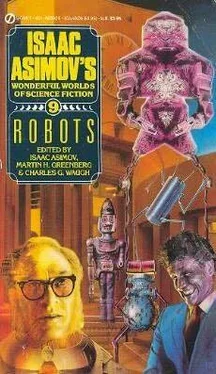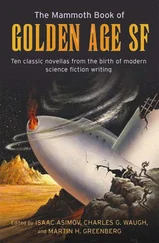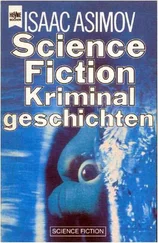Frederik Pohl - Isaac Asimov's Worlds of Science Fiction. Book 9 - Robots
Здесь есть возможность читать онлайн «Frederik Pohl - Isaac Asimov's Worlds of Science Fiction. Book 9 - Robots» весь текст электронной книги совершенно бесплатно (целиком полную версию без сокращений). В некоторых случаях можно слушать аудио, скачать через торрент в формате fb2 и присутствует краткое содержание. Год выпуска: 1989, ISBN: 1989, Издательство: Robinson Publishing, Жанр: Фантастика и фэнтези, на английском языке. Описание произведения, (предисловие) а так же отзывы посетителей доступны на портале библиотеки ЛибКат.
- Название:Isaac Asimov's Worlds of Science Fiction. Book 9: Robots
- Автор:
- Издательство:Robinson Publishing
- Жанр:
- Год:1989
- ISBN:ISBN: 1-85487-041-6
- Рейтинг книги:4 / 5. Голосов: 1
-
Избранное:Добавить в избранное
- Отзывы:
-
Ваша оценка:
- 80
- 1
- 2
- 3
- 4
- 5
Isaac Asimov's Worlds of Science Fiction. Book 9: Robots: краткое содержание, описание и аннотация
Предлагаем к чтению аннотацию, описание, краткое содержание или предисловие (зависит от того, что написал сам автор книги «Isaac Asimov's Worlds of Science Fiction. Book 9: Robots»). Если вы не нашли необходимую информацию о книге — напишите в комментариях, мы постараемся отыскать её.
Isaac Asimov's Worlds of Science Fiction. Book 9: Robots — читать онлайн бесплатно полную книгу (весь текст) целиком
Ниже представлен текст книги, разбитый по страницам. Система сохранения места последней прочитанной страницы, позволяет с удобством читать онлайн бесплатно книгу «Isaac Asimov's Worlds of Science Fiction. Book 9: Robots», без необходимости каждый раз заново искать на чём Вы остановились. Поставьте закладку, и сможете в любой момент перейти на страницу, на которой закончили чтение.
Интервал:
Закладка:
7.
A crowd of metal, ceramic, and cyborg-flesh surrounded a single, pale old-style human, floating stripped to his shorts, sipping a frosted squeeze-tube of amber liquid.
"Actually, it's not too unpleasant a place," he told those gathered around in the conference room. "But it's a good thing I violated orders and looked outside when I did. I was able to turn off all unnecessary power and lighting in time to slow the heat buildup. "As it was, it got pretty hot toward the end of the fifteen days."
The director was still obviously in a state of shock. The globular-form bureaucrat had lapsed from Utilitarian dialect, and spoke in the quasi-human tones he had grown up with.
"But… but the ship's interior should not have heated up so! The vessel was equipped with the best and most durable refrigerators and radiators we could make! Similar models have operated in the solar system and on slowboat starships for hundreds of years!"
Jason nodded. He sipped from his tube of iced lemonade and grinned.
"Oh yeah, the refrigerators and radiators worked just fine… just like the cooling plant." He gesture out the window, where the huge radiator globe could be seen drifting slowly across the sky.
"But there was one problem. Just like the cooling plant, the shipboard refrigeration system was designed to work in normal space!"
He gestured at the blackness outside, punctuated here and there by pinpoint stars.
"Out there, the ambient temperature is less than three degrees, absolute. Point your radiators into intergalactic space and virtually no radiation hits them from the sky. Even the small amount of heat in supercooled helium can escape. One doesn't need compressors and all that complicated gear they had to use in order to make cryogens on Earth. You hardly have to do more than point shielded pipes out at the blackness and send the stuff through 'em. You mechanical types get the cheap cryogens you need. But in hyperspace it's different!
"I didn't have the right instruments, so I couldn't give you a precise figure, but I'd guess the ambient temperature on that plane is above the melting point of water ice! Of course, in an environment like that the ship's radiators were horribly inefficient… barely good enough to get rid of the heat from the cabin and engines, and certainly not efficient enough-in their present design-to cool cryogens!"
The director stared, unwilling to believe what he was hearing. One of the senior scientists rolled forward.
"Then the previous crews…"
"All went mad or died when the cryo-helium evaporated! Their superconducting brains overheated! It's the one mode of mortality that is hard to detect, because it's gradual. The first effect is a deterioration of mental function, followed by insanity and violence. No wonder the previous crews came back all torn up! And autopsies showed nothing since everything heats up after death, anyway!"
Another tech sighed. "Hyperspace seemed so harmless! The theory and the first automated probes… we looked for complicated dangers. We never thought to…"
"To take its temperature?" Jason suggested wryly.
"But why look so glum!" He grinned. "You all should be delighted! We've found out the problem, and it turns out to be nothing at all."
The director spun on him. "Nothing? You insipid biological, can't you see? This is a disaster! We counted on hyperspace to open the stars for us. But it is infernally expensive to use unless we keep the ships small.
"And how can we keep them small if we must build huge, intricate cooling systems that must look out into that boiling hell you found? With the trickle of cryogens we'll be able to maintain during those weeks in hyperspace, it will be nearly impossible to maintain life aboard!
"You say our problems are solved," the director spoke acidly. "But you miss one point, Witness Engineer Forbs! How will we ever find crews to man those ships?"
The director hummed with barely suppressed anger, his eye-cells glowing.
Jason rubbed his chin and pursed his lips sympathetically. "Well, I don't know. But I'd bet with a few minor improvements something could be arranged. Why don't you try recruiting crews from another 'boiling hell'… one where water ice is already melted?"
There was silence for a moment. Then, from the back of the room, came laughter. A mechano with a seal of office hanging from his humaniform neck clapped its hands together and grinned. "Oh, wait till they hear of this on Earth! Now we'll see how the voting goes!" He grinned at Jason and laughed in rich, human tones. "When the biologists find out about this, they'll rise up like the very tide! And so will every closet Ethicalist in the system!"
Jason smiled, but right now his mind was far from politics. All he knew was that his wife and son would not live in shame. His boy would be a starship rider, and inherit the galaxy.
"You won't have any trouble recruiting crews, sir," he told the director. "I'm ready to go back any time. Hyperspace isn't all that bad a place. "Would you care to come along?"
Super-cold steam vented from the director's carapace, a loud hiss of indignation. The Utilitarian bureaucrat ground out something too low for Jason to overhear, even though he leaned forward politely.
The laughter from the back of the room rose in peals of hilarity. Jason sipped his lemonade and waited.
How-2
by Clifford D. Simak
Gordon Knight was anxious for the five-hour day to end so he could rush home. For this was the day he should receive the How-2 Kit he'd ordered and he was anxious to get to work on it.
It wasn't only that he had always wanted a dog, although that was more than half of it-but, with this kit, he would be trying something new. He'd never handled any How-2 Kit with biologic components and he was considerably excited. Although, of course, the dog would be biologic only to a limited degree and most of it would be packaged, anyhow, and all he'd have to do would be assemble it. But it was something new and he wanted to get started.
He was thinking of the dog so hard that he was mildly irritated when Randall Stewart, returning from one of his numerous trips to the water fountain, stopped at the desk to give him a progress report on home dentistry.
"It's easy," Stewart told him. "Nothing to it if you follow the instructions. Here, look-I did this one last night."
He then squatted down beside Knight's desk and opened his mouth, proudly pulling it out of shape with his fingers so Knight could see.
"Thish un ere," said Stewart, blindly attempting to point, with a wildly waggling finger, at the tooth in question.
He let his face snap back together.
"Filled it myself," he announced complacently. "Rigged up a series of mirrors to see what I was doing. They came right in the kit, so all I had to do was follow the instructions."
He reached a finger deep inside his mouth and probed tenderly at his handiwork. "A little awkward, working on yourself. On someone else, of course, there'd be nothing to it."
He waited hopefully.
"Must be interesting," said Knight.
"Economical, too. No use paying the dentists the prices they ask. Figure I'll practice on myself and then take on the family. Some of my friends, even, if they want me to."
He regarded Knight intently.
Knight failed to rise to the dangling bait.
Stewart gave up. "I'm going to try cleaning next. You got to dig down beneath the gums and break loose the tartar. There's a kind of hook you do it with. No reason a man shouldn't take care of his own teeth instead of paying dentists."
"It doesn't sound too hard," Knight admitted.
"It's a cinch," said Stewart. "But you got to follow the instructions. There's nothing you can't do if you follow the instructions."
Читать дальшеИнтервал:
Закладка:
Похожие книги на «Isaac Asimov's Worlds of Science Fiction. Book 9: Robots»
Представляем Вашему вниманию похожие книги на «Isaac Asimov's Worlds of Science Fiction. Book 9: Robots» списком для выбора. Мы отобрали схожую по названию и смыслу литературу в надежде предоставить читателям больше вариантов отыскать новые, интересные, ещё непрочитанные произведения.
Обсуждение, отзывы о книге «Isaac Asimov's Worlds of Science Fiction. Book 9: Robots» и просто собственные мнения читателей. Оставьте ваши комментарии, напишите, что Вы думаете о произведении, его смысле или главных героях. Укажите что конкретно понравилось, а что нет, и почему Вы так считаете.









